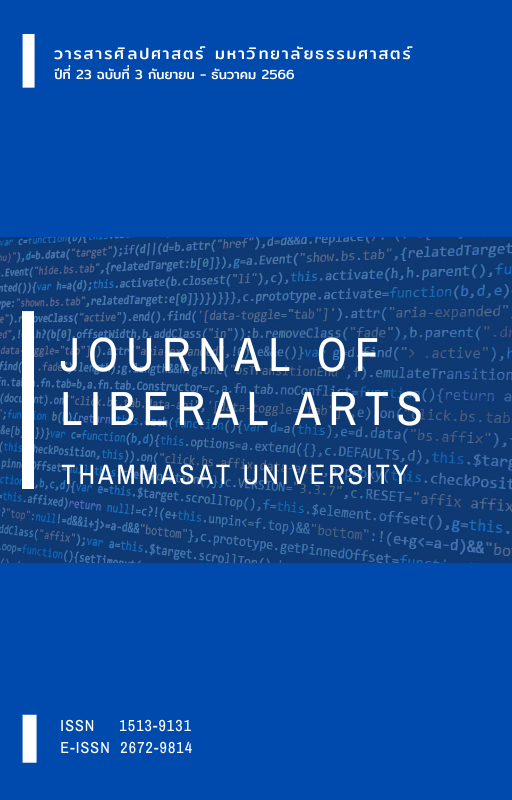ปัจจัยที่มีผลต่อลักษณะของผู้บริโภคอาหารในสถานการณ์โควิด 19 ในพื้นที่กรุงเทพมหานครและปริมณฑล
Main Article Content
บทคัดย่อ
การแพร่ระบาดของโควิด 19 ส่งผลกระทบในหลากหลายด้าน ทั้งการดำเนินชีวิตและการเดินทาง โดยเฉพาะอย่างยิ่งภาคบริการและร้านอาหารที่ได้รับผลกระทบเป็นวงกว้างในช่วงมาตรการล็อกดาวน์ ทำให้ผู้บริโภคต้องปรับเปลี่ยนชีวิตวิถีใหม่ นำไปสู่วัตถุประสงค์ของงานวิจัย 2 ประการ คือ 1) เพื่อศึกษาลักษณะของผู้บริโภคช่วงก่อนการระบาดของโควิด 19 ช่วงระหว่างการระบาดของโควิด 19 และช่วงคลายล็อกดาวน์ และ 2) เพื่อวิเคราะห์ปัจจัยที่มีผลต่อผู้บริโภคในการกลับไปรับประทานอาหารที่ร้านในช่วงที่กลับมาเปิดให้บริการ โดยเก็บข้อมูลจากผู้บริโภคที่เคยใช้บริการร้านอาหารในกรุงเทพมหานครและปริมณฑลด้วยแบบสอบถามออนไลน์ จำนวน 257 คน จากนั้นวิเคราะห์ข้อมูลด้วยวิธีการสถิติเชิงพรรณนา ร่วมกับการวิเคราะห์เชิงพื้นที่ด้วยระบบสารสนเทศภูมิศาสตร์ ผลการวิจัยพบว่า 1) ในช่วงระหว่างการระบาดของโควิด 19 ผู้คนใช้บริการสั่งอาหารดิลิเวอรีมากขึ้นควบคู่ไปกับการทำอาหารรับประทานเอง ส่วนในช่วงคลายล็อกดาวน์ ความถี่และระยะการเดินทางไปรับประทานอาหารที่ร้านลดลงกว่าช่วงก่อนการระบาด 2) ปัจจัยที่มีผลต่อผู้บริโภคในการกลับไปรับประทานอาหารที่ร้านในช่วงที่กลับมาเปิดให้บริการมากที่สุดคือ ด้านรสชาติและคุณภาพอาหาร รองลงมาคือ ปัจจัยด้านบรรยากาศภายในร้านอาหารและความรู้สึกระหว่างการรับประทานอาหารที่ร้าน ทั้งนี้ ผลวิจัยสามารถนำไปใช้เป็นแนวทางศึกษาข้อมูลผู้บริโภค และผู้ประกอบการร้านอาหารในพื้นที่อื่น ๆ ได้ในอนาคต เพื่อให้ได้ผลการวิจัยที่ครบถ้วนมากยิ่งขึ้น
Downloads
Article Details

อนุญาตภายใต้เงื่อนไข Creative Commons Attribution-NonCommercial-NoDerivatives 4.0 International License.
เอกสารอ้างอิง
กรมการปกครอง. (2564). ข้อสั่งการ COVID-19. http://report.dopa.go.th/covid19/ratchkitja.html
กรมควบคุมโรค. (2563). โรคติดเชื้อไวรัสโคโรนาสายพันธุ์ใหม่ 2019. https://ddc.moph.go.th/viralpneumonia/
กรมควบคุมโรค. (2564ก). ราชกิจจานุเบกษา ควบคุมโควิดพื้นที่เสี่ยง เริ่มวันจันทร์ที่ 28 มิ.ย. 2564 [Image attached] [Status update]. https://www.facebook.com/470988516420706/photos/ราชกิจจานุเบกษา-ควบคุมโควิดพื้นที่เสี่ยงเริ่มวันจันทร์ที่-28-มิย-2564/1704359156416963/?_rdc=2&_rdr
กรมควบคุมโรค. (2564ข). สถานการณ์โรคติดเชื้อไวรัสโคโรนา 2019 (COVID-19) มาตรการสาธารณสุข และปัญหาอุปสรรคการป้องกันควบคุมโรคในผู้เดินทาง. https://ddc.moph.go.th/uploads/files/2017420210820025238.pdf
กรมพัฒนาธุรกิจการค้า (2562). ธุรกิจร้านอาหาร บทวิเคราะห์ธุรกิจ ประจำเดือนกุมภาพันธ์25652. https://ddc.moph.go.th/uploads/publish/1177420210915075055.pdf
ธนาคารแห่งประเทศไทย. (2563). New Normal ของธุรกิจร้านอาหารในยุคโควิด 19. https://www.bot.or.th/Thai/BOTMagazine/Pages/256303_EatGuide.aspx
‘ธุรกิจร้านอาหาร’ อ่วม สั่งปิดร้านอาหารในห้าง-ห้ามนั่งกินที่ร้าน กระทบแรงงานกว่าแสนคน ฉุดยอดขายวูบ 90%. (27 กรกฎาคม 2564). มติชนออนไลน์. https://www.matichon.co.th/economy/news_2851673
ราชกิจจาฯ ประกาศเกณฑ์คลายล็อกดาวน์ มีผล 1 ก.ย. 2564 นี้. (29 สิงหาคม 2564). ประชาไท. https://prachatai.com/journal/2021/08/94720
สำนักทะเบียนกลาง. (2564). จำนวนราษฎรทั่วราชอาณาจักร 2564. https://stat.bora.dopa.go.th/stat/y_stat54.htm
สำนักยุทธศาสตร์และประเมินผล, กองสารสนเทศภูมิศาสตร์. (2556). กรุงเทพฯปัจจุบัน. https://apps.bangkok.go.th/info/m.info/nowbma/
Pran Suwannatat. (15 พฤษภาคม 2563). โควิดเปลี่ยนพฤติกรรมผู้บริโภค อาหารสำเร็จรูปขายดี นิยมสั่งเดลิเวอรี่เพิ่มขึ้นกว่า 38%. https://brandinside.asia/customer-behavior-covid-19
Buckley, P. J., Pinnegar J. K., Painting, S. J., Terry, G., Chilvers, J., Lorenzoni, I., Gelcich, S., & Duarte, C. M. (2017). Ten thousand voices on marine climate change in Europe: Different perceptions among demographic groups and nationalities. Frontiers in Marine Science, 4, 206. https://doi.org/10.3389/fmars.2017.00206
Cavallo, C., Sacchi, G., & Carfora, V. (2020). Resilience effects in food consumption behaviour at the time of Covid-19: Perspectives from Italy. Heliyon, 6(12), https://doi.org/10.1016/j.heliyon.2020.e05676
Donthu, N., & Gustafsson, A. (2020). Effects of COVID-19 on business and research. Journal of business research, 117, 284-289. https://doi.org/10.1016/j.jbusres.2020.06.008
Esri. (2019). Directional Distribution (Standard Deviational Ellipse). https://desktop.arcgis.com/en/arcmap/10.7/tools/spatial-statistics-toolbox/directional-distribution.htm
Hussain, M. W., Mirza, T., & Hassan, M. M. (2020). Impact of COVID-19 pandemic on the human behavior. International Journal of Education and Management Engineering, 10(8), 35-61. https://doi.org/10.5815/ijeme.2020.05.05
Jeong, M., Kim, K., Ma, F., & DiPietro, R. (2022). Key factors driving customers’ restaurant dining behavior during the covid-19 pandemic. International Journal of Contemporary Hospitality Management, 34(2), 836-858. https://doi.org/10.1108/IJCHM-07-2021-0831
Jia, S. (2021). Analyzing restaurant customers’ evolution of dining patterns and satisfaction during COVID-19 for sustainable business insights. Sustainability, 13(9), 4981. https://doi.org/10.3390/su13094981
Lashley, M. A., Acevedo, M., Cotner, S., & Lortie, C. J. (2020). How the ecology and evolution of the COVID‐19 pandemic changed learning. Ecology and Evolution, 10(22), 12412-12417. https://doi.org/10.1002/ece3.6937
Our World in Data. (2022). Thailand: Coronavirus pandemic country Profile. https://ourworldindata.org/coronavirus/country/thailand
Tuzovic, S., Kabadayi, S., & Paluch, S. (2021). To dine or not to dine? Collective wellbeing in hospitality in the COVID-19 era. International Journal of Hospitality Management, 95, 102892. https://doi.org/10.1016/j.ijhm.2021.102892
Wei, C. V., Chen, H., & Lee, Y. M. (2021). Factors influencing customers’ dine out intention during COVID-19 reopening period: The moderating role of country-of-origin effect. International Journal of Hospitality Management, 95, 102894. https://doi.org/10.1016/j.ijhm.2021.102894
Wen, H., & Liu-Lastres, B. (2022). Consumers’ dining behaviors during the COVID-19 pandemic: An application of the protection motivation theory and the safety signal Framework. Journal of Hospitality and Tourism Management, 51, 187-195. https://doi.org/10.1016/j.jhtm.2022.03.009
Yamane, T. (1973). Statistics: an introductory analysis (3 ed.). Harper and Row Publications.
Zhang, N., Jia, W., Lei, H., Wang, P., Zhao, P., Guo, Y., Dung, C.-H., Bu, Z., Xue, P., & Xie, J. (2021). Effects of human behavior changes during the coronavirus disease 2019 (COVID-19) pandemic on influenza spread in Hong Kong. Clinical Infectious Diseases, 73(5), e1142-e1150. https://doi.org/10.1093/cid/ciaa1818
Zhong, Y., Oh, S., & Moon, H. C. (2021). What can drive consumers’ dining-out behavior in China and Korea during the COVID-19 pandemic?. Sustainability, 13(4), 1724. https://doi.org/10.3390/su13041724


